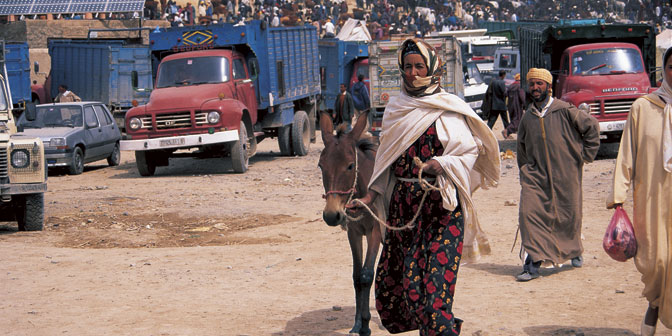Click
here to listen to Paola talk about this festival
This
is an excerpt from the book Celebrating Women.
We stop to ask directions in the High
Atlas Mountains of Morocco. Two young Berber women wear vibrant blue
scarves that show only beautiful eyes outlined in kohl. Proud, tall,
shy, they approach the window of our SUV. Instead of speaking their
native Tamazight, the women speak Arabic with Sarhan, my handsome young
interpreter from Tangier.
The women offer a great deal more information
than we ask for. One reports that her marriage lasted a month, the other's,
a year. Both sought divorce quickly “before there were children,”
because their husbands beat them. They initiated their separations,
saying, “I want nothing from you; keep the gifts. I want a divorce.”
Now, enough time has passed that both women hope to find another husband.
Eying Sarhan flirtatiously, one says, “Will you marry me? In fact,
you could have two of us!” Sarhan laughs and says thanks, he already
has a wife.
“A lifetime ago, all women, not
just widows and divorcees, asked men to marry them,” an old man
squints, watching children play outside his tent. The wind blows
dust into our nostrils and wicks the moisture from our eyes but we
don’t move. The old man is going to tell us the story.
|
“Three
months and ten days after their husbands die or their divorces are
final, widows and divorcees are free to remarry. There are many such
women among the Ait Hadiddou. I have met a man who has been married
and divorced nine times. At the Moussem, if a divorcee meets a man
she likes, she can invite him to marry her. They can sign the papers
in the official's tent and go home together.”
Berbers in Morocco's High Atlas Mountains
are farmers and shepherds. Every year, after spending summer in the
pastures, they convene at the three day market in Agoudal to stock
up on tools, livestock and provisions for the winter, during which
their villages are isolated by cold and snow. They create a
tent city with 30,000 inhabitants. Butchers and barbers conduct business
in tents, as do merchants selling hardware, eggs, ice cream, aspirin,
jewelry and clothing. Food stalls offer mint tea, grilled lamb and
couscous. Itinerant vendors hawk tapes and cigarettes. A nearby
hill turns dark with herds of camels, cows, mules, sheep, and goats,
all offered for sale. Each night the tents, lit by lanterns, look
like peaked parchment lamps. Drum beats throb through the darkness
from the many tent parties.

|

